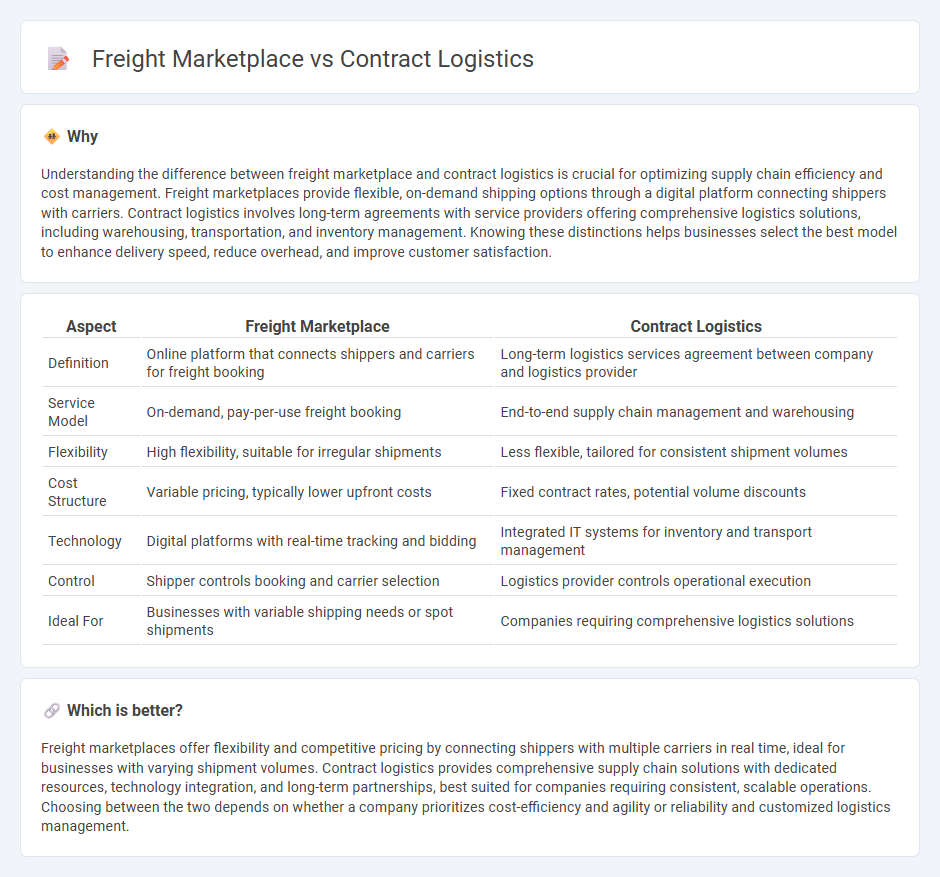
Freight marketplaces offer dynamic, real-time matching of shipments with available carriers, providing flexibility and competitive pricing for shippers. Contract logistics involves long-term agreements where providers manage tailored supply chain functions, ensuring dedicated resources and optimized operations. Explore how each solution can transform your supply chain efficiency and cost management.
Why it is important
Understanding the difference between freight marketplace and contract logistics is crucial for optimizing supply chain efficiency and cost management. Freight marketplaces provide flexible, on-demand shipping options through a digital platform connecting shippers with carriers. Contract logistics involves long-term agreements with service providers offering comprehensive logistics solutions, including warehousing, transportation, and inventory management. Knowing these distinctions helps businesses select the best model to enhance delivery speed, reduce overhead, and improve customer satisfaction.
Comparison Table
| Aspect | Freight Marketplace | Contract Logistics |
|---|---|---|
| Definition | Online platform that connects shippers and carriers for freight booking | Long-term logistics services agreement between company and logistics provider |
| Service Model | On-demand, pay-per-use freight booking | End-to-end supply chain management and warehousing |
| Flexibility | High flexibility, suitable for irregular shipments | Less flexible, tailored for consistent shipment volumes |
| Cost Structure | Variable pricing, typically lower upfront costs | Fixed contract rates, potential volume discounts |
| Technology | Digital platforms with real-time tracking and bidding | Integrated IT systems for inventory and transport management |
| Control | Shipper controls booking and carrier selection | Logistics provider controls operational execution |
| Ideal For | Businesses with variable shipping needs or spot shipments | Companies requiring comprehensive logistics solutions |
Which is better?
Freight marketplaces offer flexibility and competitive pricing by connecting shippers with multiple carriers in real time, ideal for businesses with varying shipment volumes. Contract logistics provides comprehensive supply chain solutions with dedicated resources, technology integration, and long-term partnerships, best suited for companies requiring consistent, scalable operations. Choosing between the two depends on whether a company prioritizes cost-efficiency and agility or reliability and customized logistics management.
Connection
Freight marketplaces streamline the matching of shippers and carriers by providing real-time availability and competitive pricing, enhancing efficiency in contract logistics operations. Contract logistics relies on these platforms to optimize transportation planning, inventory management, and last-mile delivery through transparent communication and data integration. Leveraging freight marketplaces reduces costs and improves supply chain responsiveness for contract logistics providers.
Key Terms
**Contract Logistics:**
Contract logistics involves long-term partnerships where providers manage end-to-end supply chain processes including warehousing, transportation, and inventory management, ensuring tailored solutions and operational efficiency for businesses. Unlike freight marketplaces that facilitate spot transactions between shippers and carriers, contract logistics focuses on strategic collaboration, integrated technology, and continuous improvement to optimize supply chain performance. Explore how contract logistics can transform your supply chain with customized, scalable solutions.
Warehousing
Contract logistics offers tailored warehousing solutions with integrated inventory management, ensuring optimized storage and real-time tracking. Freight marketplaces primarily provide access to warehousing spaces on-demand, facilitating flexibility but often lacking bespoke service integration. Explore our comprehensive guide to understand which warehousing option best fits your supply chain needs.
Inventory Management
Contract logistics offers tailored inventory management solutions through integrated warehousing, real-time tracking, and demand forecasting, ensuring precise stock control and reduced holding costs. Freight marketplaces primarily facilitate shipping transactions without comprehensive inventory oversight, limiting their effectiveness in dynamic stock management. Explore detailed strategies and comparisons to optimize your inventory management approach.
Source and External Links
Contract logistics definition - Contract logistics involves long-term partnerships covering a wide array of services such as product conveyance, warehousing, stock management, delivery, after-sales service, and reverse logistics including returned goods management and recycling, tailored to optimize the supply chain operations for industrial companies or retailers.
Contract Logistics: Everything You Need To Know - Waredock - Contract logistics is a third-party logistics service where a company outsources part or all of its supply chain management like storage, transportation, order fulfillment, and distribution to a specialized provider who delivers customized and scalable solutions to improve supply chain efficiency and reduce costs.
Contract Logistics vs. 3PL: Best Outsourcing Option | ShipBob - Contract logistics focuses primarily on managing delivery and transportation efficiently, often helping with bulk transport to 3PL warehouses, while 3PLs offer a broader range of services including inventory, warehouse management, order fulfillment, and real-time tracking, providing more end-to-end supply chain solutions.
 dowidth.com
dowidth.com